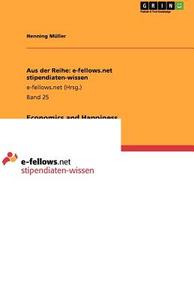
Economics and Happiness
- Editore:
GRIN Publishing
- EAN:
9783640945061
- ISBN:
3640945069
- Pagine:
- 24
- Formato:
- Paperback
- Lingua:
- Tedesco
Descrizione Economics and Happiness
Seminar paper from the year 2009 in the subject Economics - Other, grade: 1,7, Johannes Gutenberg University Mainz, language: English, abstract: "Money does not buy happiness" - with that statement Richard Easterlin (1974)somehow initiated a new field of research for economists. Within the last thirty yearsplenty of surveys and dozens of papers were produced to identify the determinants ofhappiness. Unfortunately little importance was attached to a definition or a consistentconcept of what "happiness" is. Only within the last decade happiness research hasgained the self-efficacy to educe policy recommendations from its own insights - withambiguous success.In my paper I will give a brief summary of the central findings in happiness researchand introduce some approaches of explanations for surprising evidence. In the end Iwill present a few policy recommendations to illustrate the above mentioned dubiousnessof success. As I have to present plenty of evidence I will set aside criticismof methodology in every single survey and leave it with a cross-the-board one rightnow: happiness research has to catch up to a considerable degree in methods ofconceptualization, measurement and statistics.In the first section, I will present a general approach to the term "happiness", its useand its measurement. Next I will describe the main identified and examined determinants1of happiness - namely income, unemployment and inflation, democracy,hardship and inequality. Section 4 deals with concepts that perhaps can give a microtheoreticalfoundation for some of the results in happiness research. Not surprisinglythey stem from psychology because classic economic theory assuming rational decisions("homo oeconomicus") is not capable of describing irrationalities like rivalry,adaptation or aspiration level shifts. In the last section I will introduce some implicationsfor policy found in literature. Finally, the content of this paper is summarized.Modern economic policy aims at stabilizing a steady economic growth. In contrast,Aristotle defines "happiness" as self-sufficiency. Thus, there is an obvious discrepan-cy between happiness and what were reaching for today. So we should first take alook at what we want to study.

